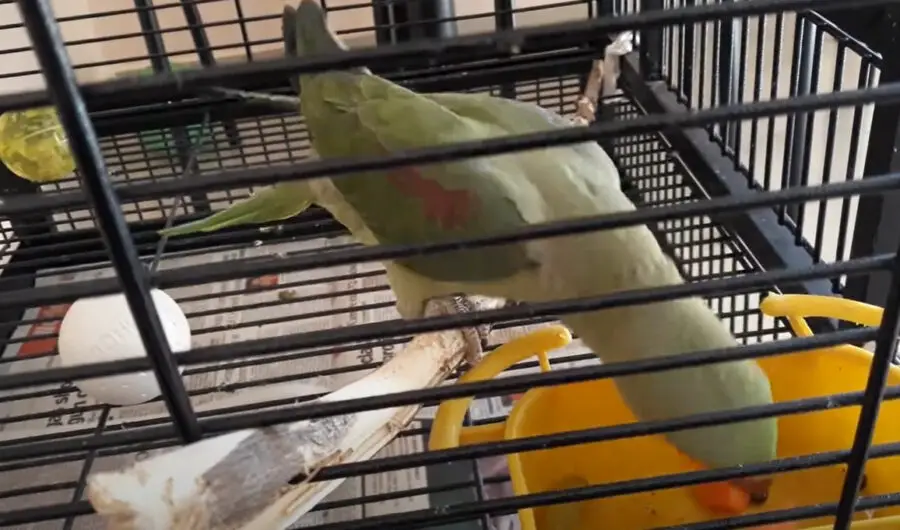Are you thinking of giving papaya to your parrot, can parrots eat papaya?
Is papaya good for them? How often can they eat papaya?
I will cover all this and more below.
Can Parrots Eat Papaya
Yes, parrots can eat papaya. Papaya is a nutritious fruit that can be a healthy addition to a parrot’s diet. It is rich in vitamins A, C, and E, as well as folate, potassium, and dietary fiber.
When feeding papaya to your parrot, it is important to ensure that the fruit is ripe and properly prepared. Remove the skin, seeds, and any hard or unripe parts, as they may be difficult for the parrot to digest or pose a choking hazard.

Cut the papaya into small, bite-sized pieces that are easy for the parrot to handle.
As with any new food, introduce papaya gradually and observe your parrot’s response. Some parrots may readily accept papaya and enjoy it as a treat, while others may be more cautious or have individual preferences. Remember to offer a balanced diet that includes a variety of fruits, vegetables, grains, and a suitable parrot pellet or seed mix to ensure your parrot’s nutritional needs are met.
How Often Can You Feed Parrots Papaya
Papaya can be included as part of a varied diet for parrots, but it should not be the sole or primary food source. Parrots require a diverse diet that includes a variety of fruits, vegetables, grains, and a suitable parrot pellet or seed mix to meet their nutritional needs.
When it comes to feeding papaya to your parrot, moderation is key. Papaya can be given as an occasional treat or as part of a rotational diet. It is not necessary to feed papaya every day, but rather, you can offer it a few times a week or as a special treat.
This allows your parrot to enjoy the nutritional benefits of papaya without overdoing it.
How To Prepare Papaya For Parrots
To prepare papaya for parrots to eat, follow these steps:
- Choose a Ripe Papaya: Select a ripe papaya that is firm but slightly soft to the touch. The skin should be orange or yellow, and there should be no signs of mold or spoilage.
- Wash the Papaya: Rinse the papaya thoroughly under cool running water to remove any dirt or residue on the skin.
- Remove the Skin: Use a sharp knife to cut off the top and bottom of the papaya. Then, carefully peel the skin off the papaya. Alternatively, you can use a vegetable peeler to remove the skin.
- Remove Seeds and Pulp: Cut the papaya in half lengthwise. Use a spoon to scoop out the seeds and the surrounding pulp. The seeds are not suitable for parrots and should be discarded.
- Cut into Bite-Sized Pieces: Slice the papaya into small, bite-sized pieces that are appropriate for your parrot’s size. Ensure the pieces are manageable and easy for your parrot to handle.
- Serve to Your Parrot: Place the prepared papaya pieces in your parrot’s food dish or offer them as a handheld treat. You can also mix the papaya with other fruits or vegetables to provide a varied diet.
Remember to offer fresh papaya to your parrot and remove any uneaten portions after a couple of hours to prevent spoiling. It’s important to clean your parrot’s food dishes regularly to maintain hygiene.
Can Parrot Eat Papaya Seeds
No, Parrots should not eat papaya seeds. While the flesh of ripe papaya is safe and nutritious for parrots, the seeds are not suitable for their consumption. Papaya seeds contain a compound called carpaine, which can be toxic to birds in large quantities.
To ensure the safety of your parrot, it is best to remove the seeds when preparing papaya for them to eat. Cut the papaya in half lengthwise, scoop out the seeds and the surrounding pulp using a spoon, and discard them.
What Is Papaya Rich In
Papaya is rich in various essential nutrients and beneficial compounds. Here are some of the key nutrients and compounds found in papaya:
- Vitamin C: Papaya is an excellent source of vitamin C, which is a powerful antioxidant that supports the immune system, promotes collagen production, and aids in the absorption of iron.
- Vitamin A: Papaya is also a good source of vitamin A, particularly in the form of beta-carotene. Vitamin A is essential for healthy vision, immune function, and skin health.
- Fiber: Papaya is rich in dietary fiber, which promotes healthy digestion, aids in maintaining bowel regularity, and helps control blood sugar levels.
- Enzymes: Papaya contains enzymes such as papain and chymopapain, which aid in digestion and have anti-inflammatory properties.
- Potassium: Papaya is a good source of potassium, an important mineral that helps maintain proper heart function, fluid balance, and nerve signaling.
- Folate: Papaya provides a significant amount of folate, a B-vitamin that plays a crucial role in cell division, DNA synthesis, and the production of red blood cells.
- Antioxidants: Papaya contains several antioxidants, including carotenoids (such as beta-carotene and lycopene) and flavonoids. These compounds help protect the body’s cells from damage caused by free radicals and may have potential health benefits.

